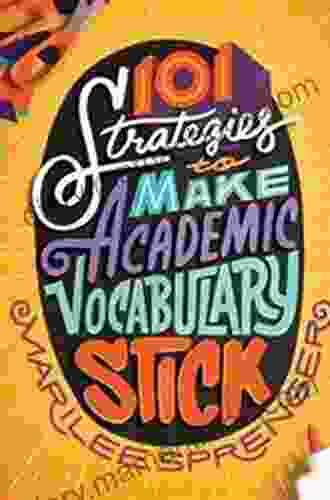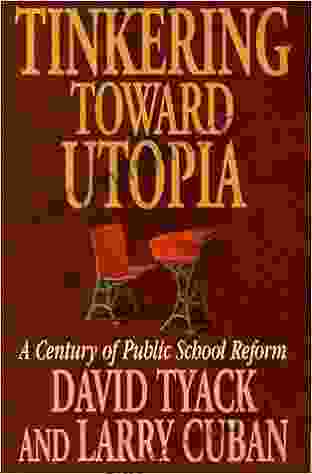A Century of Public School Reform: Triumphs and Tribulations

Public education in the United States has undergone a century of continuous reform, marked by both significant advancements and persistent challenges. This article provides a comprehensive overview of the history of public school reform, highlighting major milestones, setbacks, and ongoing debates.
4.5 out of 5
| Language | : | English |
| File size | : | 2598 KB |
| Text-to-Speech | : | Enabled |
| Screen Reader | : | Supported |
| Word Wise | : | Enabled |
| Print length | : | 184 pages |
Early Reform Efforts (1890s-1930s)
The late 19th and early 20th centuries witnessed a wave of reform efforts aimed at improving the quality and accessibility of public education. Key reforms during this period included:
* Kindergarten and Early Childhood Education: The establishment of kindergarten and preschool programs was seen as crucial for promoting early learning and preparing children for success in school. * Curriculum Standardization: School systems adopted standardized curricula to ensure that all students had access to a similar body of knowledge and skills. * Teacher Training: Teacher training institutions were established to improve the quality of classroom instruction and ensure that teachers had the necessary knowledge and skills.
Progressive Era Reforms (1900s-1920s)
The Progressive Era brought with it a surge of progressive educational reforms, including:
* Vocational Education: Schools began offering vocational programs to prepare students for specific job roles and careers. * Special Education: Schools began providing specialized services for students with disabilities and other learning challenges. * School Consolidation: Rural schools were consolidated to create larger, more efficient schools with better resources.
Mid-Century Reforms (1940s-1960s)
After World War II, public school reform efforts accelerated with the recognition that education was essential for economic and social progress. Key reforms during this period included:
* Federal Funding: The federal government began providing significant funding for public schools through programs such as the National Defense Education Act and Head Start. * Civil Rights Act (1964): This landmark legislation prohibited discrimination in education and paved the way for school desegregation. * Technology in Education: Schools began using computers and other technologies to enhance instruction and student learning.
The Reform Movement (1980s-Present)
Beginning in the 1980s, a series of reports and studies highlighted the declining performance of American public schools. This led to a wave of reform efforts known as the reform movement, which focused on:
* Accountability: Schools were held accountable for student performance through standardized testing and school report cards. * School Choice: Parents were given more options for their children's education, including charter schools and vouchers. * Teacher Quality: Standards for teacher licensure were raised, and teachers were provided with ongoing professional development opportunities.
Challenges and Debates
Despite the significant reforms implemented over the past century, public school reform continues to face a number of challenges and debates. These include:
* Inequality: Public schools in underserved communities often face significant challenges related to poverty, crime, and other social factors that hinder student achievement. * Funding: Public schools rely heavily on local property taxes, which can lead to disparities in funding between wealthy and poor communities. * Educational Standards: There is ongoing debate about the best way to set and enforce educational standards to ensure that all students are meeting expectations. * School Discipline: Concerns about school discipline have led to debates about how to balance the need for order and safety with the rights of students. * Technology in Education: While technology has the potential to enhance learning, there are also concerns about equity of access and the potential for bias in algorithms.
The past century of public school reform has been marked by both progress and challenges. While significant strides have been made in areas such as early childhood education, teacher quality, and school accountability, persistent problems related to inequality, funding, and educational standards continue to hamper the ability of public schools to meet the needs of all students. As the educational landscape continues to evolve, it is essential to engage in evidence-based policymaking and to work together to create a public education system that provides all students with the opportunity to succeed.
4.5 out of 5
| Language | : | English |
| File size | : | 2598 KB |
| Text-to-Speech | : | Enabled |
| Screen Reader | : | Supported |
| Word Wise | : | Enabled |
| Print length | : | 184 pages |
Do you want to contribute by writing guest posts on this blog?
Please contact us and send us a resume of previous articles that you have written.
 Top Book
Top Book Novel
Novel Fiction
Fiction Nonfiction
Nonfiction Literature
Literature Paperback
Paperback Hardcover
Hardcover E-book
E-book Audiobook
Audiobook Bestseller
Bestseller Classic
Classic Mystery
Mystery Thriller
Thriller Romance
Romance Fantasy
Fantasy Science Fiction
Science Fiction Biography
Biography Memoir
Memoir Autobiography
Autobiography Poetry
Poetry Drama
Drama Historical Fiction
Historical Fiction Self-help
Self-help Young Adult
Young Adult Childrens Books
Childrens Books Graphic Novel
Graphic Novel Anthology
Anthology Series
Series Encyclopedia
Encyclopedia Reference
Reference Guidebook
Guidebook Textbook
Textbook Workbook
Workbook Journal
Journal Diary
Diary Manuscript
Manuscript Folio
Folio Pulp Fiction
Pulp Fiction Short Stories
Short Stories Fairy Tales
Fairy Tales Fables
Fables Mythology
Mythology Philosophy
Philosophy Religion
Religion Spirituality
Spirituality Essays
Essays Critique
Critique Commentary
Commentary Glossary
Glossary Bibliography
Bibliography Index
Index Table of Contents
Table of Contents Preface
Preface Introduction
Introduction Foreword
Foreword Afterword
Afterword Appendices
Appendices Annotations
Annotations Footnotes
Footnotes Epilogue
Epilogue Prologue
Prologue K Sharronne
K Sharronne Deborah Chester
Deborah Chester Ralph Compton
Ralph Compton Carol A Miller
Carol A Miller Ron Simplified Myers
Ron Simplified Myers Jon Clinch
Jon Clinch Tomson Highway
Tomson Highway Shaughnessy Haynes
Shaughnessy Haynes Michael Fabricant
Michael Fabricant Anonymous Guest
Anonymous Guest Steven Saylor
Steven Saylor Kj Kalis
Kj Kalis Melissa Haag
Melissa Haag Jake Cohen
Jake Cohen Alma Plant
Alma Plant Landmark Publications
Landmark Publications Jordan Bitochi
Jordan Bitochi James Mcglynn
James Mcglynn Alberto Carretero
Alberto Carretero Aldous Carroll
Aldous Carroll
Light bulbAdvertise smarter! Our strategic ad space ensures maximum exposure. Reserve your spot today!

 Dakota PowellThe Ultimate Rat Terrier Dog Handbook: A Comprehensive Guide to Owning and...
Dakota PowellThe Ultimate Rat Terrier Dog Handbook: A Comprehensive Guide to Owning and...
 Jeremy Mitchell50 Questions to Ask to Grow Your Relationship: Deepen Your Connection and...
Jeremy Mitchell50 Questions to Ask to Grow Your Relationship: Deepen Your Connection and... Casey BellFollow ·15.9k
Casey BellFollow ·15.9k Raymond ChandlerFollow ·15.7k
Raymond ChandlerFollow ·15.7k Isaac AsimovFollow ·4.4k
Isaac AsimovFollow ·4.4k Chadwick PowellFollow ·8.3k
Chadwick PowellFollow ·8.3k Logan CoxFollow ·5.5k
Logan CoxFollow ·5.5k Hudson HayesFollow ·2.1k
Hudson HayesFollow ·2.1k Jaylen MitchellFollow ·17.6k
Jaylen MitchellFollow ·17.6k Braeden HayesFollow ·9.3k
Braeden HayesFollow ·9.3k

 Jorge Luis Borges
Jorge Luis BorgesThe Truth About the 15 Qualities That Men Secretly Admire...
Every woman wants to be loved and...

 Francisco Cox
Francisco CoxPlague Ship: Unraveling the Mystery of the Oregon Files
The Oregon Files, a collection of classified...

 Rudyard Kipling
Rudyard Kipling101 Strategies to Make Academic Vocabulary Stick: A...
Academic vocabulary is an...

 Fletcher Mitchell
Fletcher MitchellPractitioner Guide for Cities, Regions, and Countries:...
The world is...

 Emilio Cox
Emilio CoxOptimization and Security Challenges in Smart Power Grids
Smart power grids (SPGs) are emerging as a...

 Chandler Ward
Chandler WardMiles Davis and the Civil Rights Movement in America: A...
Miles Davis, the iconic jazz...
4.5 out of 5
| Language | : | English |
| File size | : | 2598 KB |
| Text-to-Speech | : | Enabled |
| Screen Reader | : | Supported |
| Word Wise | : | Enabled |
| Print length | : | 184 pages |








